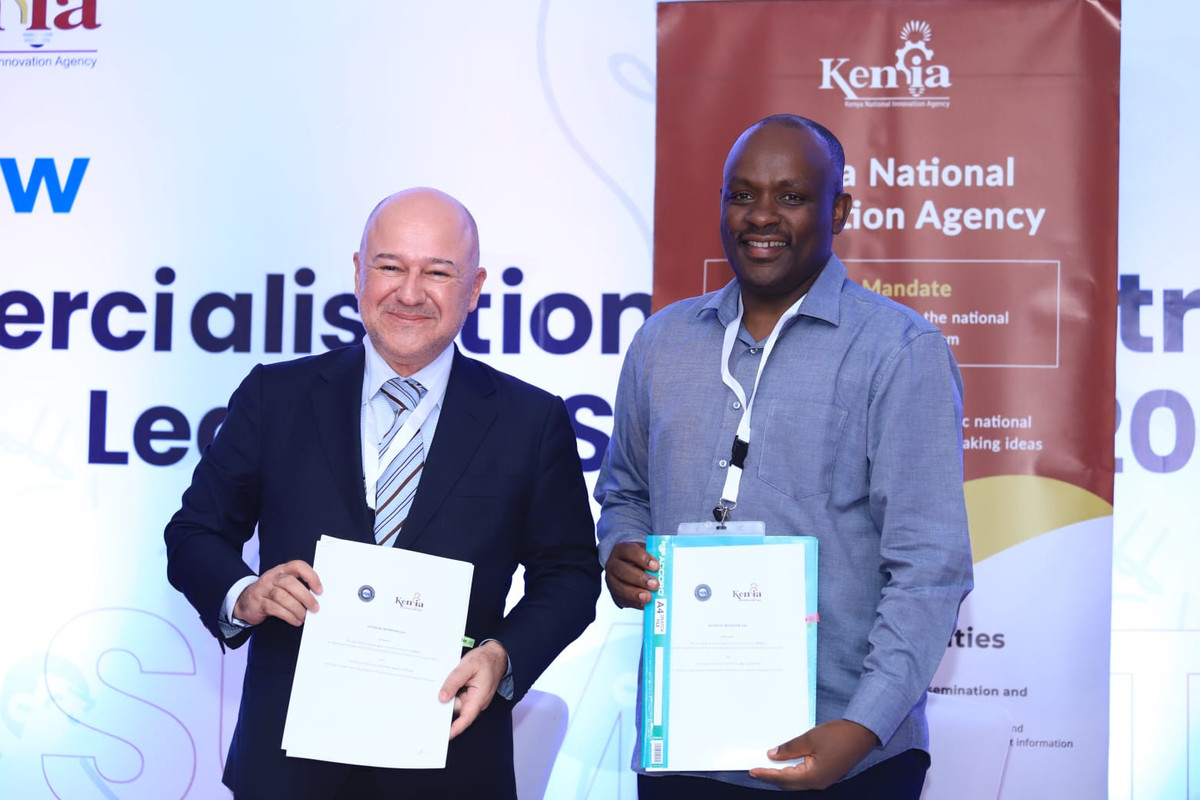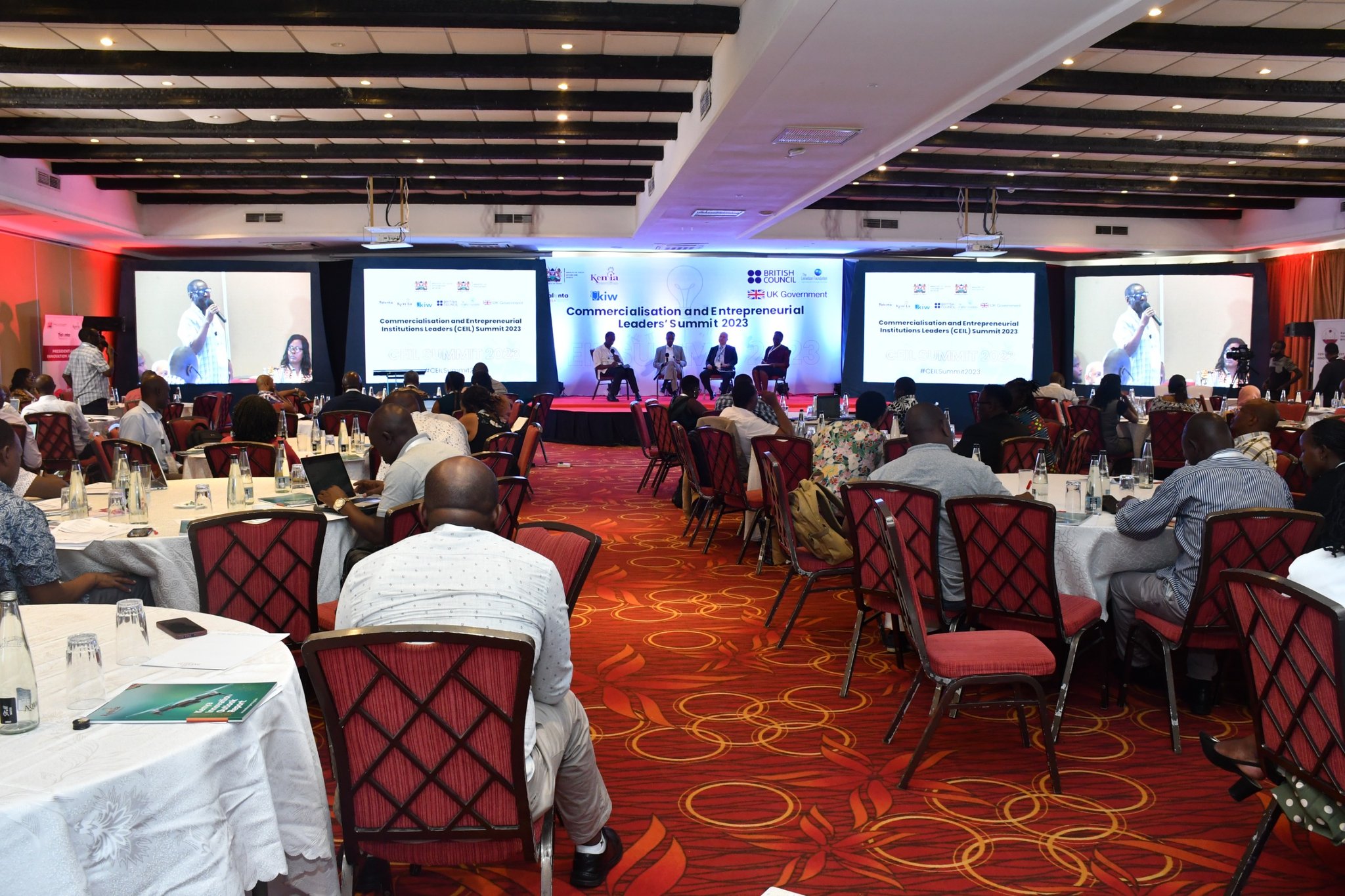
Executive Summary
On 17th - 19th October 2023, world institutional leaders, researchers, innovators and development partners gathered at the Commercialization and Entrepreneurial Institutions Leaders’ Summit in Mombasa for in-depth deliberations on fostering of innovation, promoting entrepreneurship and advancing commercialization of research outputs in Kenya and across Africa. The summit themed “Getting it right on commercialization of research outputs and ideas” sought to provide a comprehensive roadmap within the innovation ecosystem. (The summit was informed by the Kenya Innovation Outlook Report 2022) This briefing reviewed the key outcomes of CEIL2023 and provided context and nuance to the main headlines coming out of the summit. Speakers and panellists provided perspectives and key takeaways from the government, philanthropy and non-governmental perspectives. More information about CEIL Summit 2023 is available on the website at: https://www.innovationagency.go.ke/initiatives/ceil-summit
Highlights
CEIL2023 was an opportunity for institutional leaders to convene on the international stage and deliberate on key factors affecting the innovation ecosystem while also networking and forging new roadmaps to the commercialization of research outputs and innovations within Kenyan institutions.
CEIL2023 saw the development of partnerships seeking to support emerging startups within Kenyan institutions of higher learning. KeNIA CEO, Dr Tonny Omwansa officially endorsed a letter of intent between the Kenya National Innovation Agency and the World Business Angel Investment Forum. A collaboration that facilitates access for Kenyan student-led startups in higher learning institutions to global financial inclusion centres, enabling them to connect with global investors and mentors from the forum’s 148 member countries.
During CEIL2023, Cabinet Secretary for Youth Affairs, Creative Economy and Sports, Hon. Ababu Namwamba strongly recommended an elevation of research and Innovation funding to one billion Kenyan shillings, underlining the crucial role of financial backing and the substantial, enduring advantages our nation can expect to gain.
CEIL2023 saw the signing-off of five Institutional Commercialization masterplans under the Institutional Commercialization Support Program and the unveiling of the second cohort, consisting of eleven universities. KeNIA CEO, Dr Tonny Omwansa presided over the signing before Cabinet Secretary Ababu Namwamba and Principal Secretaries, Ismail Maalim and Dr Beatrice Muganda.
Top Government officials attended CEIL2023, including Ministers, Principal Secretaries Chief Executive Officers, and Vice Chancellors. 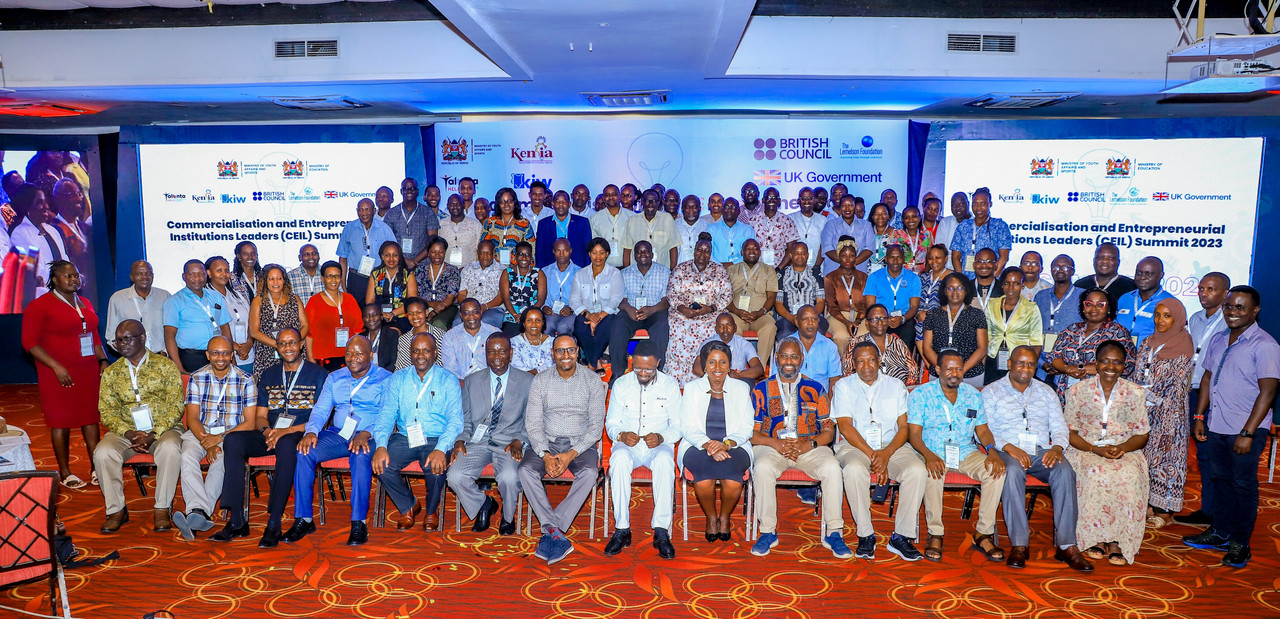
Summit Summary
Across the two days speakers in the plenary sessions provided context, background information and food for thought for participants to carry into the breakout sessions, in which they engaged in dialogue around six topics: strengthening of partnerships and collaborations, enhanced knowledge sharing, development of supportive policies and regulations, establishment of technology transfer mechanisms, fostering of an entrepreneurial and innovative culture and creation of entrepreneurial ecosystems.
A total of fifty speakers took the floor during the summit, including Ministers, Permanent Secretaries, Vice Chancellors, Representatives of Inter-Governmental Organizations, Non-Governmental Organizations, Civil Society, Development Partners, Venture Capitalists, Researchers, and Innovators among other stakeholders.
Common themes across dialogue sessions
Eight common themes across dialogue sessions emerged from the CEIL Summit 2023.
1. Commercialization:
A recurring theme throughout the summit, the Commercialization of research outputs and ideas into market products that spur economic growth and job creation pervaded every discussion. Participants thoroughly examined the significance of enhancing the capabilities of commercialization units within academic institutions. They underscored the importance of capacity development, funding, dissemination of knowledge and academia-industry linkages as essential action plans for transforming the substantial volume of research publications that often remain unused on shelves into commercially viable products.
2. Innovation as a tool for job creation:
Many conversations during the CEIL Summit 2023 established a common ground; using innovation as a tool for job creation is a strategic imperative for driving economic growth, enhancing the overall well-being of Kenyan citizens, and addressing the high rate of youth unemployment. Kenya is characterized by a predominantly youthful population, with 60% of the current residents falling within the 18-35 age bracket. With an annual population growth rate of 2.28%, participants acknowledged the need for proactive measures to address the rising unemployment rate, intensified by the expanding population.
3. Access to finance:
Funding is the lifeblood of innovation. It fuels the entire innovation ecosystem from research and development to commercialization and market adoption. It actuates resource allocation, a key determinant in an organization’s ability to achieve its goals, adapt to changing circumstances and thrive in an ever-evolving world. Throughout the summit, conversations on funding underscored its role in ensuring the National Innovation System is comprehensive and operational to facilitate the commercialization of innovations either directly or indirectly. The Cabinet Secretary for Youth Affairs and Sports, Ababu Namwamba strongly recommended an elevation of research and Innovation funding to one billion Kenyan shillings, underscoring the crucial role of financial backing and the substantial, enduring advantages our nation can expect to gain.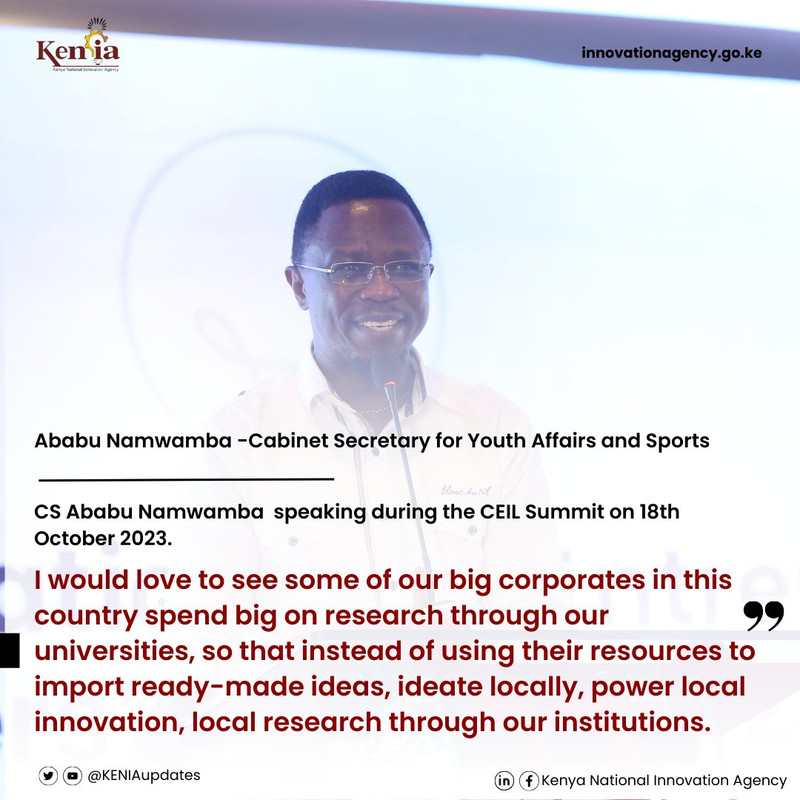
4. Academia-Industry linkages:
Long gone are the days when universities were mere educational centres. Over the years and throughout scientific revolutions, universities have become central players in regional and national economic development. The emergence of the knowledge-based innovation economy has externally influenced academic structures and internal developments of academic entrepreneurship in universities. This collaboration benefits not only academia and industry but also society. Both players attributed a lack of absorptive capacity for created innovations, a weak industrial base of local industries and poor integration of research activities as some of the factors that contributed to the deficiency in this partnership. Simultaneously identifying staff mobility across the sectors as a pivotal solution to this issue.
CEIL2023 saw the signing off of 5 Institutional Commercialization masterplans under the Institutional Commercialization Support Program and the unveiling of the second cohort, consisting of 11 universities. KeNIA CEO, Dr Tonny Omwansa presided over the signing before Cabinet Secretary Ababu Namwamba and Principal Secretaries, Ismail Maalim and Dr Beatrice Muganda. Many academic institutions declared their interest in joining the program, led by KeNIA in collaboration with the Africa Centre for Technology Studies, through the support of UKAid’s Africa Technology and Innovation Partnership program. The initiative’s overall objective is to work with interested universities and research organizations to strengthen and streamline their systems and processes towards the successful commercialization of their research outputs.
5. Developing an innovative culture as a nation:
Participants recognized that developing an innovative culture within a nation is of paramount importance as it encourages creativity, entrepreneurship and adaptability, leading to economic growth, job creation, improved quality of life and long-term sustainability. They acknowledged that academic institutions stand at the forefront of achieving a comprehensive and cultured National Innovation System.
6. Protection of Intellectual property:
An integral theme throughout the summit, participants engaged in conversations about the significance of intellectual property management and the crucial role it plays in ensuring innovators fully leverage their intellectual assets. Attendees delved into the current infrastructures, highlighting a lack of awareness among students and researchers on existent policies. The Principal Secretary for the State Department for Youth Affairs and Sports, Ismail Maalim reiterated its importance, pinpointing substantial advantages that can be realized through the fundamental act of safeguarding intellectual property.
7. Cross-sectoral innovation for a progressive nation:
Cross-sectoral innovation provides a novel approach to problem-solving which is crucial in addressing complex challenges, improving the quality of life, driving economic growth and creating a sustainable future. Innovation succinctly put is the creation of new value to the world. Any significant advancement can be traced back, either directly or indirectly, to an innovation, whether it is the development of a brand-new product or the enhancement of an existing product or value chain. Leading us to the conclusion that, at the nucleus of progress, stands innovation. A claim is easily substantiated by comparing the way of life today to that of, say, a century ago. These days, we use electric buses, video chat, employ electric cookers for food preparation, and a host of other modern-day conveniences. When new ideas or technologies are developed and applied, they tend to generate greater output with the same input. More goods and services are produced, stimulating job creation, additional income and business profitability. And as productivity increases more goods and services are produced, hence the economy grows. To stay ahead of the curve, it is crucial, if not imperative that we fuse innovation with every sector.
Innovation on the SDG table sits at number 9, alongside infrastructure and industry. For a very long time, developing nations have prioritized the two, viewing them as long-term investments whereas innovation is seen as a temporary investment. This has been a significant differentiating factor between developing and developed nations, with the latter placing an equal, if not more, emphasis on innovation as the backbone of their national development. Participants dissected the significant role it plays in the transfer of knowledge, resources and expertise, leading to more comprehensive and effective solutions to the problems we face as a nation
8. The importance of forging meaningful partnerships:
Partnerships provide the collaborative framework, resources and diversity of perspectives needed to drive breakthroughs and stay competitive in a rapidly evolving world. Participants endorsed the current rate of partnerships forged by the government, acknowledging that placing Kenya on the global map will bear enormous long-term benefits. KeNIA CEO Dr Tonny Omwansa officially endorsed a letter of intent between the Kenya National Innovation Agency and the World Business Angel Investment Forum. A collaboration that facilitates access for Kenyan student-led start-ups in higher learning institutions to global financial Inclusion centres, enabling them to connect with global investors and mentors from the forum’s 148 member countries. Many of the conversations were in concordance that the value start-ups create in both the national and subnational economy should not be underestimated in that they attract local and foreign investments, rapidly create jobs for highly skilled and unskilled workers, build local value chains and export goods and services.
Research to Commercialization pitches
The research-to-commercialization (R2C) program is designed to help researchers, academics and entrepreneurs bridge the gap between innovative research ideas and commercial success by forging collaborations between researchers, industry partners and investors to create commercially viable products or services. KeNIA in partnership with Victoria Ventures is implementing the R2C accelerator with a focus on strengthening both the researchers’ capacity and the institution’s technology transfer capacity. Selected innovators were able to pitch at the CEIL summit with Peter Kibet – Aflasafe, Dr Wycliffe Chisutia Wanyonyi-Green Leather Revolution and Dr Ann Carol – Wastewater Treatment taking the top three spots. 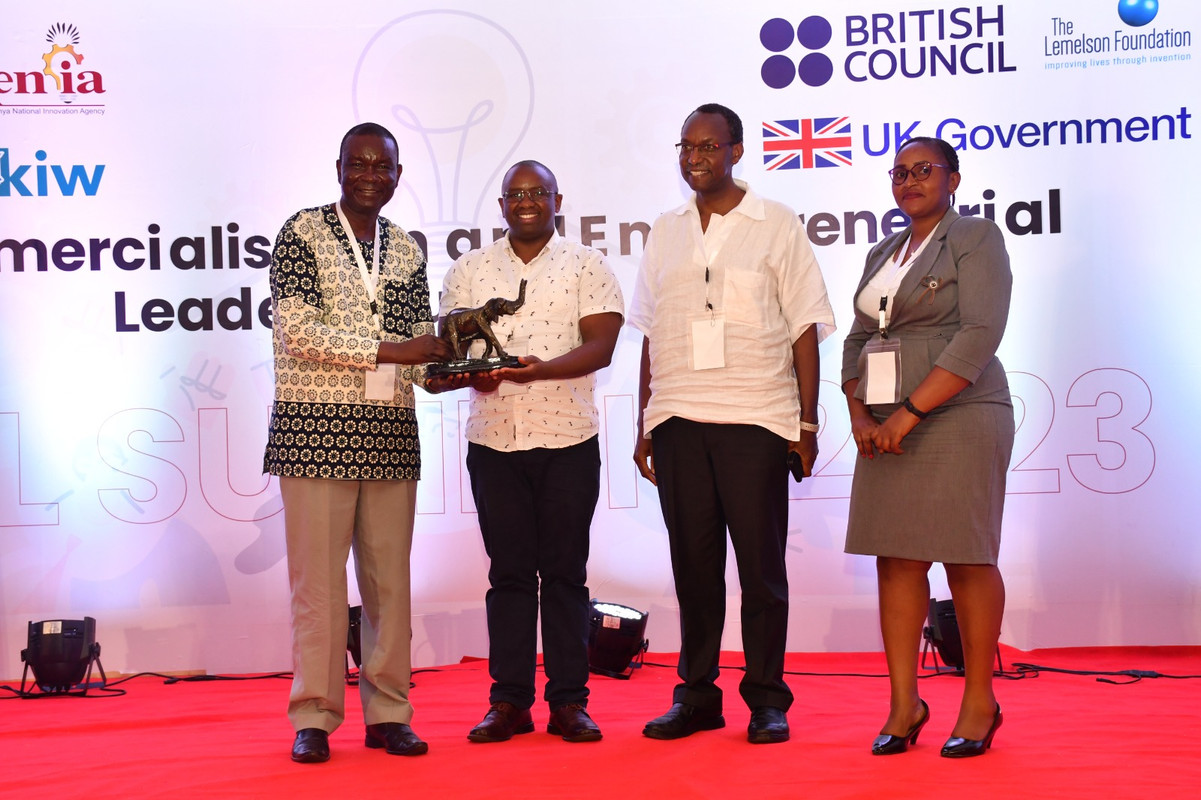
KeNIA and WBAF partnership
Digitization in the wake of the COVID-19 pandemic proved to be of paramount importance and relevance in ensuring continuity of access to financial services. G20 finance ministers and Central bank governors (FMCBGs) endorsed the G20 action plan, in which they committed to promoting financial inclusion by maintaining accessible and affordable financial products and services through conventional and responsible digital means while ensuring financial consumer protection. WBAF Financial Inclusion Center, a product of this agreement, enables student-led startups of higher learning to access funding and mentorship digitally across the forum's 148 member countries. Signing the agreement, KeNIA CEO, Dr Tonny Omwansa lauded the move, highlighting the vast opportunities it presents for the start-up economy. 